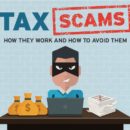Despite concerns regarding another government shutdown, the IRS is expected to get itself into gear for the upcoming tax season. While the overall risk of being audited is generally low, new changes resulting from the enacted Tax Cuts and Jobs Act could impact your susceptibility of being audited this tax season.
Before identifying the red flags that may increase your chances of IRS scrutiny, it is important to clarify the definition of an audit. Today, most IRS inquiries are related to inconsistencies in the amount of income, interest or capital gains being reported. This type of notice, also known as a correspondence audit, accounts for roughly 80 percent of audits and usually states the amount of additional tax due. Taxpayers can pay the difference or dispute the requested tax by providing supporting documentation. On the other hand, a full-blown audit is usually handled by an IRS agent and involves a much more exhaustive process that examines the majority of your return. Keep in mind, the IRS can audit returns for up to three years. Consider reviewing IRS Publication 3948-A, The Examination Process for additional details on the process.
Earning too much
While earning too much income is certainly a good problem to have, it can increase your chances of an audit. According to the latest IRS statistics, the overall chance of being audited is only .7%. However, your odds of being targeted increase exponentially as income rises. Taxpayers with income of $200,000 or more had a 1.7 percent chance of being audited - roughly 1 in 59 taxpayers. The chance of being audited jumps to over 5.8 percent (1 in 17 taxpayers) if you earned $1 million or more. Remember, higher earnings usually equate to higher levels of IRS scrutiny.
Failing to report all of your income
Various forms of income are provided to the IRS from outside sources such as your employer, financial institution and retirement plan. Failing to report all income received on W2s, 1099s, etc. can cause the IRS to raise an eyebrow. Remember, they cross reference these forms against data provided on your return for any inconsistencies. Whether intentional or not, leaving out income that may be reported to the IRS from other sources can signal that your return needs a closer look. This also applies to those using digital currencies. Consider taking special care to ensure that all income is accurate and properly accounted for.
Mortgage Interest deduction
Prior to the Tax Cuts and Jobs Act, deduction limits for mortgages and home equity lines of credit (HELOC) were limited to $1 million and $100,000 respectively. Additionally, home equity line interest up to the limit could be deducted from your taxes and used for unrelated expenses like education funding or even financing an automobile.
Today, the Tax Cuts and Jobs Act changes how you deduct mortgage interest, making some taxpayers more susceptible to making some major errors. According to
Christine Darcy, CPA of Darcy & Company CPAs, LLC of Spring Lake Heights NJ, “Deductible qualified residence interest is now based upon two limitations, the first is a $750,000 balance limit for married filers and the second is that the mortgage must be considered home acquisition debt that was used to buy and or improve your first or second residence and is secured by that residence.” This also means that you can only deduct interest on home equity line debt that is used for the same purpose – to acquire or improve your residence, still subject to the overall $750,000 limit. Darcy adds, “Mortgage or home equity interest can no longer be deducted to pay for college, buying a car or purchasing a second home.” The changes also highlight the importance of record keeping. Darcy notes, “This change really places the responsibility on the taxpayer to keep good records to substantiate that funds are being used properly.”
Careless Mistakes
Minimizing simple errors is another simple, yet overlooked approach to reducing the amount of attention the IRS gives to your return. Incorrect social security numbers, rudimentary mathematical mistakes and other silly typos can lead to additional IRS scrutiny. Consider carefully double-checking your return as this may help to prevent these often overlooked and easily avoidable errors.
Large Charitable Deductions
The Tax Cuts and Jobs Act is projected to impact the number of taxpayers that are able to deduct charitable contributions. This is because you must itemize your deductions. With the standard deduction doubled to $12,000 for individuals and $24,000 for married couples, itemizing may only be appropriate for taxpayers with deductions that exceed the standard deduction. As a result, many taxpayers are expected to “bunch” deductions into one tax year to reach the threshold for itemizing. Because the IRS monitors returns
for taxpayers that are donating a disproportionately large amount compared to other comparable taxpayers, large charitable contributions can lead to additional IRS scrutiny.
Despite these concerns, be careful not to allow the fear of an IRS audit to limit your charitable endeavors. Instead, be sure to be diligent when documenting all charitable contributions according to IRS rules. Reviewing IRS Publication 526 - Charitable Contributions and Publication 561 - Determining the Value of Donated Property can help ensure you can substantiate all tax-deductible contributions on your return. The IRS should not and does not want to impact your ability to make a difference in the lives of others – just be sure to document.
Deducting Personal expenses through your business
Unsurprisingly, the IRS is more likely to carefully scrutinize the most commonly abused tax deductions. For this reason, excessively high business deductions for meals, travel, entertainment and automobiles are often inflated by personal expenses. For example, some business owners might attempt to deduct 100 percent of the cost of their personal vehicle or deducting personal expenses through their business – often throwing up a red flag to the IRS. Remember, the automobile deductions for business use cannot include personal use and most meet specific criteria for deductibility. Be sure to substantiate business use with detailed logs noting mileage and destinations for business travel. Additionally, business owners often that push the envelope by deducting personal meals, personal travel and personal entertainment as deductible business expenses can also run into trouble. Be sure that you are limiting your deductions to allowable business expenses while also maintaining supporting documentation.
Owning a cash business
In addition to deducting personal expenses like automobiles, travel and entertainment through your business, owning a “cash business” may also increase the chances of your return being audited by the IRS. From carwashes and restaurants to hair salons and laundromats, cash intensive businesses tend receive more IRS scrutiny than others. In addition, workers who receive a large percentage of their income in the form of cash tips should also be careful. The IRS may be understaffed but they certainly understand that the use of cash can lead to inaccuracies in the reporting of income and expenses. Cash industries should work with their accountant to ensure accurate reporting of income and expenses.
In the event you are targeted for an audit, review IRS Publication 556 - Examination of Returns, Appeal Rights and Claims for Refund for additional information on audit procedures. Remember, this information should not be construed as tax advice. Since everyone’s tax situation is unique, consider speaking to your accountant to determine the most appropriate approach for you.
Kurt J. Rossi, MBA, CFP®, CRPC®, AIF® is a CERTIFIED FINANCIAL PLANNERtm Practitioner & Wealth Advisor. He can be reached for questions at 732-280-7550, kurt.rossi@Independentwm.com, www.bringyourfinancestolife.com & www.Independentwm.com. LPL Financial Member FINRA/SIPC.









